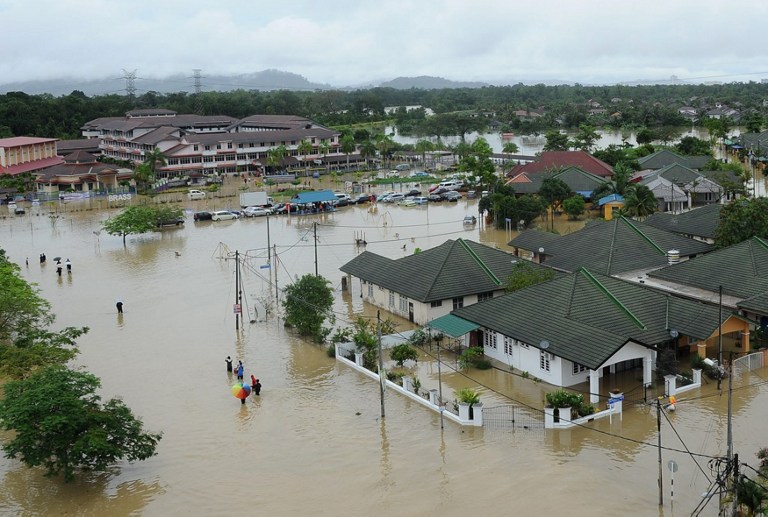KUALA LUMPUR, Dec 7 — Lynas’s rare earth plant in Kuantan is still operating with “no risk” of radioactive leakage there despite the massive floods in the past few days, the Malaysian regulator Atomic Energy Licensing Board (AELB) has said.
When contacted by The Malay Mail Online, AELB explained that the area where radioactive waste was stored was not touched by the floods in the Pahang state capital.
“The residue storage areas and retention ponds are intact and are not affected by the floods in Kuantan and AELB is monitoring the situation closely,” AELB said in an email response last night.
In addressing concerns that radioactive materials could leak into the ground and underground water due to flooding, AELB explained that the lining in the waste storage facility would prevent this from happening.
“The floods will not cause radioactive leaks from the Water Leached Purification (WLP) Residue Storage Facility (RSF). The RSF has HDPE and clay liners which will prevent leaking and leaching of material into the ground,” it said.
But even if the RSF was flooded, there would be “no risk of radioactive waste leaking to the surrounding areas”, AELB said, pointing to the dilution of the WLP residue’s radioactivity concentration.
“Should the RSF overflow and spill over into the retention pond, the radioactivity concentration of the WLP residue will, in effect, be diluted thus bringing the radiation levels down.
“One of the principles of radioactive waste management is to lower the radioactivity concentration by the “dilute and disperse” technique,” it said.
The WLP residue is reportedly the only one out of three by-products of Lynas’ refining process that is radioactive, with a reading of six becquerel per gram.
AELB also said Lynas had already factored in the possible scenario of heavy monsoon rain when carrying out a study, saying: “The worst case scenario of heavy monsoon rain has been taken into account in the Radiological Impact Assessment carried out by Lynas.”
AELB said it constantly monitored the operations at the Lynas plant, with its radiation level readings being “either within or below the normal background level”.
Yesterday, Lynas Malaysia Sdn Bhd said its refinery — which it said was built according to national and international regulations — was not affected by the massive floods in Kuantan and is operating as usual.
Lynas also allayed fears that the waste stored in its residue storage facility (RSF) would leak into the ground due to the heavy downpour in Kuantan, noting that the RSF was designed to prevent leaching and had met international and national standards.
Critics previously voiced concern that the plastic lining in the RSF would not be able to keep the waste from leaking out, reportedly claiming that it was too thin and insisted that the company identify a permanent disposal facility (PDF) site.
On Thursday, state news agency Bernama reported that over 38,000 people in Pahang have been evacuated from their homes due to severe flooding caused by heavy rain since last Sunday.
On Wednesday, Bernama reported that Kuantan was almost paralysed, with power and water supply cut off in most parts of the state capital, with the town and its surrounding areas recording flood levels of between one to two metres.
Unconvinced by the company’s repeated assurances that its plant does not pose any safety and health hazards, local environmental activists continue to protest and insist that Lynas shuts down its RM2.5 billion Lynas Advanced Materials Plant (LAMP) in Kuantan.
Himpunan Hijau said 1.2 million Malaysians had by then signed its petition launched in August in their bid to close down the plant, with the activist group’s chairman Wong Tack saying on the same day that Lynas must pull out of the country by June 29 next year or face a massive street protest.
In September last year, AELB granted Lynas (Malaysia) Sdn Bhd its TOL, which came with several conditions. AELB’s then director-general Raja Datuk Abdul Aziz Raja Adnan had said the TOL would be for a two-year period that would end on September 2, 2014.
On its website, Lynas said that it had on July 2 this year submitted its plans to recycle the waste for commercial purposes and its plans for a PDF, with AELB now reviewing the documents which Lynas was required to submit within 10 months of the issuance of the TOL.



















